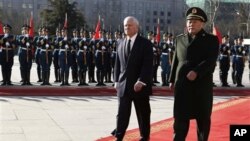China deferred a request for a new strategic defense dialogue with the United States Monday during a meeting in Beijing between the two countries’ defense chiefs. But the officials did agree on a series of other talks and exchanges marking the end of a difficult year for U.S.-China defense relations.
China gave U.S. Defense Secretary Robert Gates a rousing, sun soaked welcome outside the Defense Ministry, complete with a goose-stepping honor guard. But inside, the protocol gave way to what both sides called "candid" talks.
Gates and his Chinese counterpart, General Liang Guanglie, agreed to finally implement a series of military exchanges first agreed to more than a year ago, but then frozen by China to protest a U.S. arms sale to Taiwan. The exchanges will include a visit to the United States by the head of the People’s Liberation Army, talks aimed at avoiding naval incidents at sea and a new set of talks designed to create a framework for future defense relations, to be concluded by the end of the year.
But Minister Liang said China agreed only to "study" Secretary Gates’ key proposal at the meeting - to establish a new strategic dialogue to improve understanding of each other’s policies on nuclear weapons, cyber warfare, missile defense and the use of outer space for military purposes.
The other main issue for Secretary Gates is his desire for a consistent defense relationship with China.
"We are in strong agreement that in order to reduce the chances of miscommunication, misunderstanding or miscalculation, it is important that our military-to-military ties are solid, consistent and not subject to shifting political winds," Gates said.
The U.S.-China defense relationship is just now coming out of the latest eight-month China-imposed freeze. And while Minister Liang also spoke of the need for a "stable" defense relationship, he sharply criticized U.S. arms sales to Taiwan, saying they "damaged China’s core interests," and he called on the United States to change its policy.
"What I want to emphasize here is that we also hope the United States will pay sufficient attention to the concerns of the Chinese side and take measures and gradually remove or reduce the obstacles that stand in the way of our military-to-military relations," said Liang.
Under U.S. law, the government is required to help Taiwan maintain its defenses. Minister Liang said he hopes U.S. arms sales to Taiwan will not disrupt relations in the future, but asked by a reporter he declined to pledge China will not freeze relations again if there is another sale.
Last year, Secretary Gates said he thought leaders of the People’s Liberation Army, like Minister Liang, might not be as committed to developing relations with the United States as both country’s civilian leaders are.
But in spite of continuing disagreement about the arms sales, naval rights and the potential threat posed by new high-technology Chinese weapons, Gates said Monday he has changed his view.
"I come away from the meetings this morning, optimistic and confident that the leadership of the PLA is as committed to fulfilling the mandate of our two presidents as I am," said Gates.
Gates said he hopes the resumption of talks and exchanges will lead to a better understanding of how China intends to use its fast increasing military power.
The U.S. defense secretary's visit to Beijing comes the week before Chinese President Hu Jintao travels to Washington. Gates said Chinese leaders wanted him to come to Beijing first to formally end the defense relations freeze and help set the tone for the summit.
New US-China Defense Talks Planned, But No ‘Strategic Dialogue’




